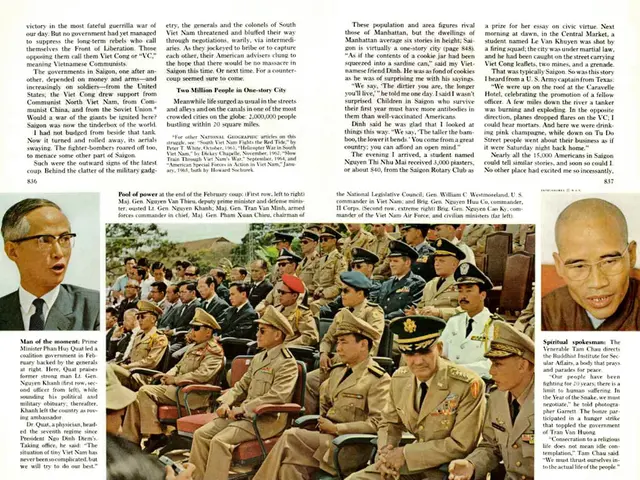A Young Poet's Immersion into Bohemian Moscow of the Late 60s: The Discovered Manuscript of Eduard Limonov
In the spring of 1969, a young poet named Eduard Limonov, along with his civilian wife, Anna Rubinstein, made their way to Moscow, seeking to engage with the city's vibrant bohemian poetry scene. "Moscow May," a novel penned by Limonov years later, recounts their journey over three days from May 18 to 20, skillfully interweaving the author's personal and literary background. The book was written after the much-acclaimed "New York Trilogy" and a series of novels from the "Kharkiv Trilogy."
Real-life figures populate the book's pages, such as poets Arseny Tarkovsky and Leonid Gubanov, artists Ilya Kabakov and Ernst Neizvestny. After completing the manuscript, Limonov sought the advice of literary critic and publisher Maria Rovanova. Her recommendation against publication might have been due to potential reactions from the living characters depicted in the book. Consequently, the novel remained unpublished for decades—with Limonov believing it was lost forever.
In a poignant memory, Limonov shared that part of his extensive library was burned by a former Foreign Legion corporal while he was away. Among the books consumed by the flames was his unpublished manuscript for "Moscow May." Limonov considered the manuscript weak, which is why he refrained from publishing it. However, now he likely would have published it, lamenting the loss of the literary document that captures a specific historical moment and serves as his personal diary as a poet.
The long-lost manuscript was miraculously discovered in 1998 in the archive of Andrei Sinyavsky at the Hoover Institution at Stanford University. Sinyavsky's widow, writer and literary scholar Maria Rovanova, had transferred the archive to the US following her husband's death.
Nearly four decades after its composition, "Moscow May" is once again available for readers, giving them a look into the cultural landscape of Moscow in the late 1960s while providing insights into the life and mind of a young, aspiring poet named Eduard Limonov.
During a meeting at the House of Writers in Moscow, Limonov and his friend encountered Arseny Tarkovsky, a seminar leader and fellow poet whose elegant demeanor initially put off the young Limonov. Tarkovsky's disciples were expected to worship him. However, Limonov's plans did not align with that scenarios, and he soon dismissed Tarkovsky from his aspirations.
Lenochka Ignatyeva, a young woman with a striking presence, pleased Limonov. He admired her, oftentimes imagining ideals beyond physical attraction. Lenochka, though, prefered individual meetings with her favorite poets.
In the House of Writers, Tarkovsky welcomed a young poet named Masha, who read her works to the group. Limonov's provincially rough exterior and unassuming poetry style set him apart from the polished, sophisticated young talents gathered there.
Little is known about author Eduard Limonov and his novel "Moscow May," but based on his work, the novel likely reflects Limonov's signature blend of autobiographical detail, political radicalism, and underground culture. Originally circulated among dissident circles, it is likely that the book was published after political liberalization and the end of censorship in Russia.
- Eduard Limonov, fascinated by the fashion-and-beauty and lifestyle of Moscow's bohemian poetry scene in 1969, visited various venues, such as the House of Writers, to engage with fellow poets.
- Amidst the literary figures present at the House of Writers, personal-growth seekers will find Limonov's interactions with Arseny Tarkovsky, Masha, and Lenochka Ignatyeva, all of whom played significant roles in shaping Limonov's journey.
- The novel "Moscow May," a testament to Limonov's experiences in Moscow, incorporates elements of education-and-self-development, featuring discussions on poetry and literature.
- Eduard Limonov, a poet with a keen interest in sports, might have enjoyed watching sports-analysis and sports-betting debates alongside his fellow writers, as these topics were popular in the city's vibrant cultural scene.
- Readers intrigued by career-development and entertainment can find solace in Limonov's vivid depictions of Moscow's artistic and literary milieu, as captured in his novel "Moscow May."







